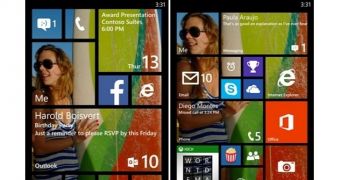Microsoft’s Windows Phone operating system is continuing its ascension on the mobile market at a steady though slow pace, the latest data coming from analyst firm ABI Research claims.
According to the company, the platform grew 119 percent in Q1 2014 when compared to the same quarter a year ago, reaching 3 percent market share on the smartphone OS segment.
Furthermore, it seems that the operating system also managed to grow on a quarterly basis, though only by 16 percent. Even so, considering that we’re talking about Q1 sales versus Q4 ones, the increase is still noticeable.
However, the platform still has a lot of catch up to do when compared to other leading mobile operating systems out there, such as Android and iOS.
At the moment, Google’s Android is the dominating mobile OS, with 80 percent market share, including AOSP. According to ABI Research, about 300 million Android smartphones were shipped in the first quarter of this year.
Basic mobile phones lost even more market share in the time frame, accounting for 30 percent of total handset shipments, down 44 percent when compared to the same quarter a year ago. In Q4 last year, they accounted for 35 percent of total shipments.
“Interestingly, basic mobile phones lost 5% market share and Android picked up almost all of these users, suggesting Android is set to gain almost all of the billions of mobile subscribers still upgrading to smartphones,” Nick Spencer, senior practice director, mobile devices, said.
“Certainly, Android looks set to completely dominate the high growth developing markets and increase its market share still further.”
Apple’s iOS platform, however, managed to grow 17 percent in sales year-on-year, though it went down 14 percent sequentially. In Q1 2014, the platform accounted for 10 percent of total shipments. According to the research firm, iPhone 5c did not help sales as Apple might have expected it to.
As mentioned above, Windows Phone succeeded in gaining market share in the three-month period, thus pushing BlackBerry’s platform back a bit more. Sales of BlackBerry phones (both legacy and BlackBerry 10) dropped quarter on quarter and on a yearly basis.
“Microsoft Windows Phone is currently the only viable third ecosystem. BlackBerry has faded on all fronts (BlackBerry 10 and OS) and while Firefox remains a potential low-cost challenger, it has yet to make any significant impact,” Spencer also said.
What remains to be seen is whether Windows Phone will manage to accelerate growth, especially now that Nokia’s Devices & Services division is part of Microsoft, and that more makers out there have announced plans to release phones running under the platform.

 14 DAY TRIAL //
14 DAY TRIAL //